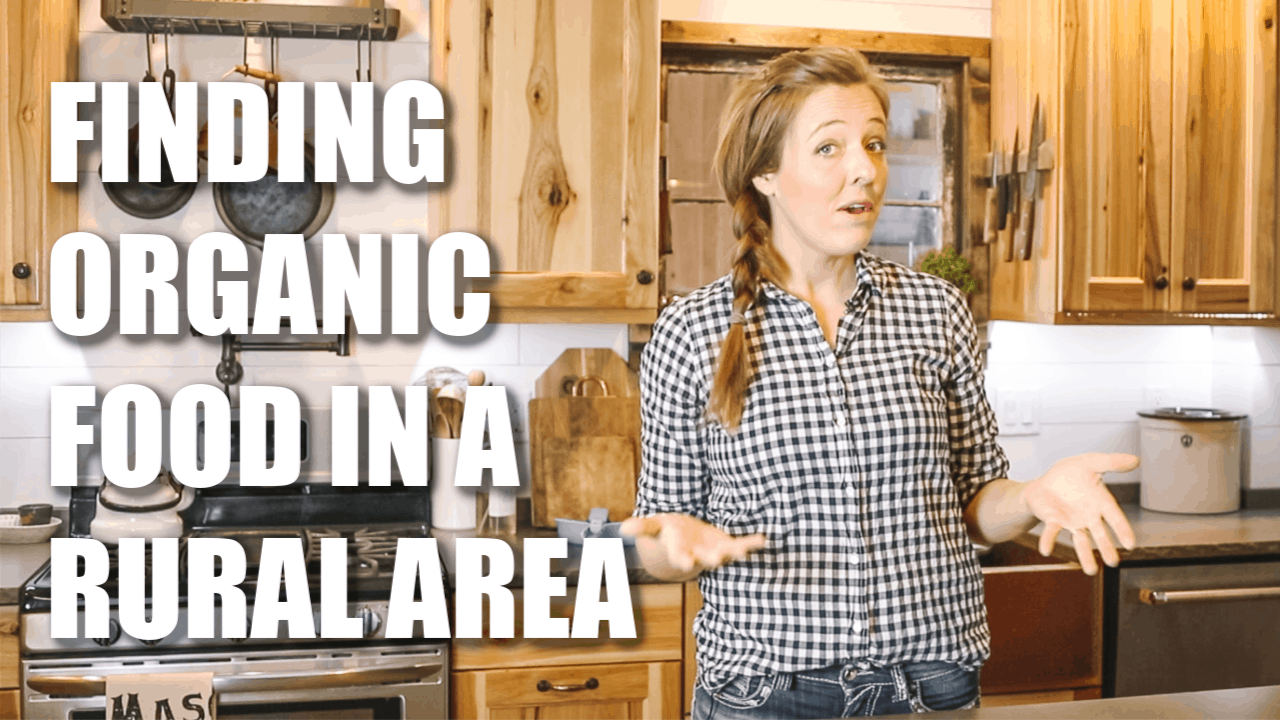
Oh Wyoming…
I love you, but you sure can be frustrating when it comes to grocery shopping sometimes…
Walmarts and traditional grocery stores abound, but if organic foods are your jam, well, things get a little more complicated…
I figured I surely can’t be the only one who has to get a little extra creative when it comes to shopping for slightly less conventional groceries, so on the small chance this might be helpful to a few of you, here is how I manage to stock our pantry, cabinets, and larder, with pretty decent options– even though there isn’t a Trader Joes or a Whole Foods in the entire state.
How I Grocery Shop for Organic Foods in a Rural Area
(This is the video, but if you prefer the text version, keep scrolling!)
Grow It!
The first strategy I use when I’m stocking our pantry or freezers is to grow as much as possible, which probably doesn’t come as a surprise to any of you. Our food production really, really takes the edge off of our grocery bill, even though it ebbs and flows depending on the seasons.
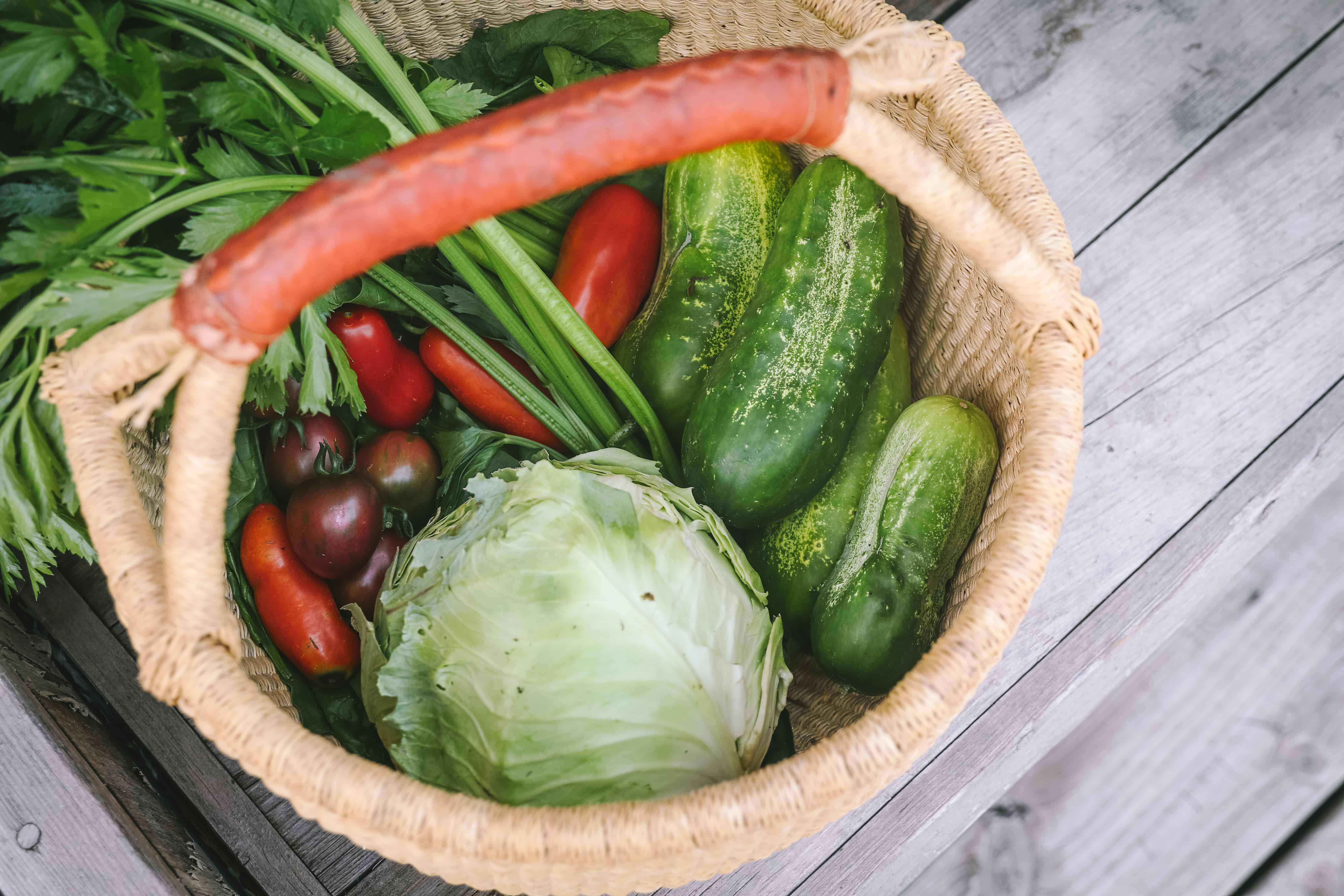
What We Grow:
- All our own beef (about one steer every 12 to 18 months)
- Most of our pork (about one, two hogs every other year or so)
- All of our own chicken (we do a batch of 30 meat birds one to two times per year depending on how much room I have in the freezer)
- A lot of our own dairy (which does vary a bit depending on the cow’s lactation cycle or how much cream she’s giving)
- Almost all of our own eggs, although the chickens sometimes go into seasonal periods where they stop laying and I have to supplement from the store.
- Enough vegetables, potatoes, garlic and onions in our garden to last for about 8 months of the year, although it depends on how robust the garden was that year.
I know growing a ton of food at home isn’t in the cards for everyone, but I do think that everyone can grow at least a little something, even if it is a herb garden in the windowsill. However if you can’t grow your own meat, eggs, or dairy, I do recommend taking the time to seek out local producers or farmers for those items.
I love being able to support local growers whenever I’m a little short on pork in the freezer or tomatoes in the garden. And I don’t mind paying a little bit more for products that I know have been grown sustainably or grown ethically or grown locally with better practices and standards.
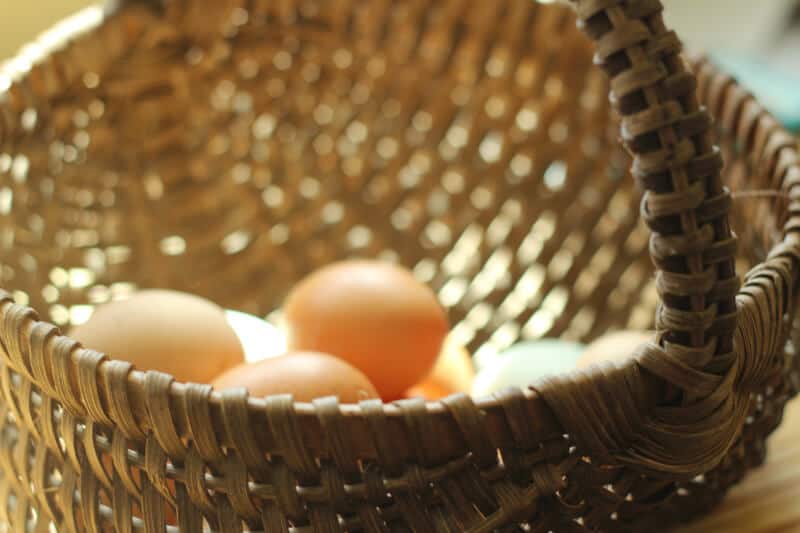
Supplement with Conventional Grocery Stores
We do buy a few things locally at our regular grocery stores (about 35 miles away) even though we don’t have a lot of options there. There is one tiny natural food store in the town is south of us and that’s where I will get sometimes low-temp vat-pasteurized milk if the cow is dry, pastured eggs to supplement the hens if they’re not laying (and I can’t make it to the farmer’s market), or the occasional organic pantry item.
I also get some things at just the regular old grocery store– yes, really. We follow the 80/20 rule, which means I’m just not hung up on eating a “perfect” diet. Sometimes I buy tortillas or sandwich bread or chips– I know how to make those things myself, but it doesn’t always work with my schedule, plain and simple. And sometimes you just gotta prioritize your sanity.
We also pick up things like bananas or avocados at the local stores–those aren’t items we’re able to order, and growing them here in Wyoming ain’t gonna happen.
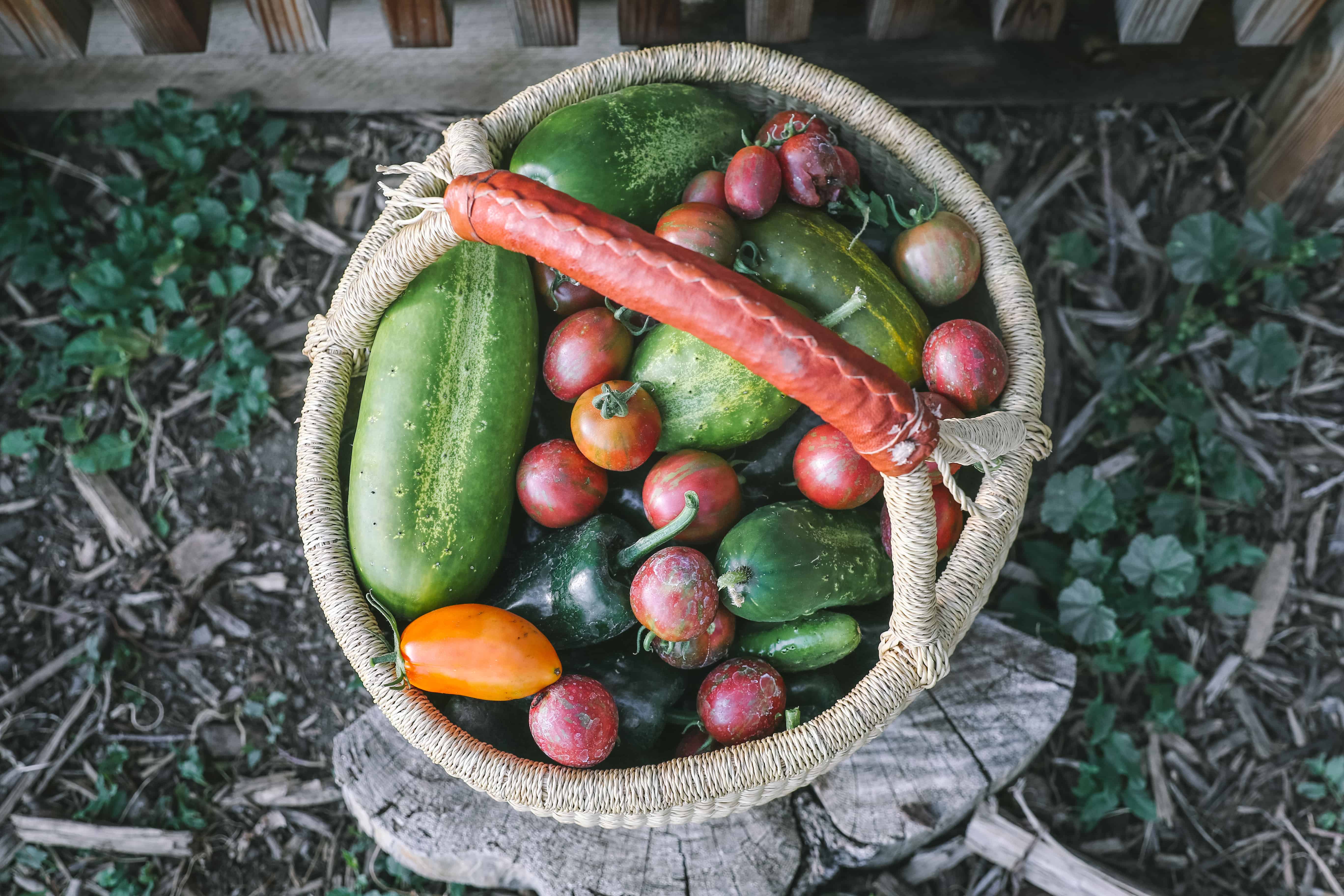
The Farmer’s Market
We have a farmer’s market that runs in our area from August to October. It’s not quite as robust as markets in other areas, but I will occasionally grab boxes of fruit or larger amounts of vegetables for preservation (if I had a bad year with the garden). I don’t go as much as I like, as driving all the way to town on Saturday mornings generally doesn’t mesh with our calendar, but hopefully you have a more available or more accessible farmer’s market in your area and you can take advantage of that in your grocery shopping.
Costco Wholesale
Another store I add into our routine is Costco (I like them WAY better than Sam’s Club). The closest one is about an hour and a half away, so I don’t go there all the time (usually once every 1-2 months). We didn’t get a membership until last year, but I’m actually using it way more than I thought I would. I love Costco for things like quality cheeses or organic lunch meats to have when we have crews of people working here. I also grab organic pasta, organic tortilla chips, coffee beans, toilet paper, paper towels, and organic produce there. I’m usually pleasantly surprised at what organic options they have, if you know where to look.
Thrive Market
I’ve known about Thrive Market for a while now, but honestly I didn’t really fully take advantage of them into last year. Basically, they’re kind of like a cross between Amazon and Whole Foods, but they’re entirely online. You do get a membership just like Costco and then you order whatever you want, whenever you want.
They usually have free shipping for orders over $50, so I keep a running list and only place an order when I have a considerable number of items. until I’m over that $50 threshold and then I buy a lot of organic pantry staples or dry goods or greens, nuts, things like that.
Things I Love to Get from Thrive Market
- Sea salt
- Maple syrup
- Sucanat and coconut sugar
- Coconut milk
- Popcorn
- Spices/herbs
- Dried beans
- Rolled oats
- Nuts
- Organic condiments (ketchup, mustard, apple cider vinegar, etc)
Thrive Market fills in a ton of the gaps I have from living in a “whole foods desert” and they save me trips to town, which is a huge bonus.

Azure Standard
The last option that I’ve used intermittently over the years is Azure Standard. (They don’t deliver everywhere, but if you live in the west/midwest, you probably have access to them) Azure is a bulk food-buying coop, so you do have to find a group in your area to order with, but they are a good option to save money if you need larger quantities of whole/organic foods.
Because of the way they ship the food in on a semi truck, you do have to coordinate drop times, which is a little tricky when you live as far out of town as we do. That, combined with the fact, I don’t really feel the need to have 100lbs of beans in my basement at all times, has kept me from ordering with them recently.
What I Used to Get from Azure Standard:
- 50 lb bags of whole cane sugar, whole wheat, lentils, beans
- Large pails of organic peanut butter and raw honey
- 50 lb bags of kelp and diatomaceous earth for the animals
- Boxes of organic apples, peaches, etc, for canning
And there you have it folks. My grocery shopping method isn’t perfect, but it works for us. And now that I’m in the routine of it, it really doesn’t take that long. I firmly believe you don’t have to live in a mecca of organic foods or stores to have a more whole foods lifestyle that’s much healthier for you
YOUR TURN!
If you live a rural area like me, I’d love to hear your best tips for treasure-hunting organic and whole foods!

The post How I Grocery Shop for Organic Foods in a Rural Area appeared first on The Prairie Homestead.
Via Gardening http://www.rssmix.com/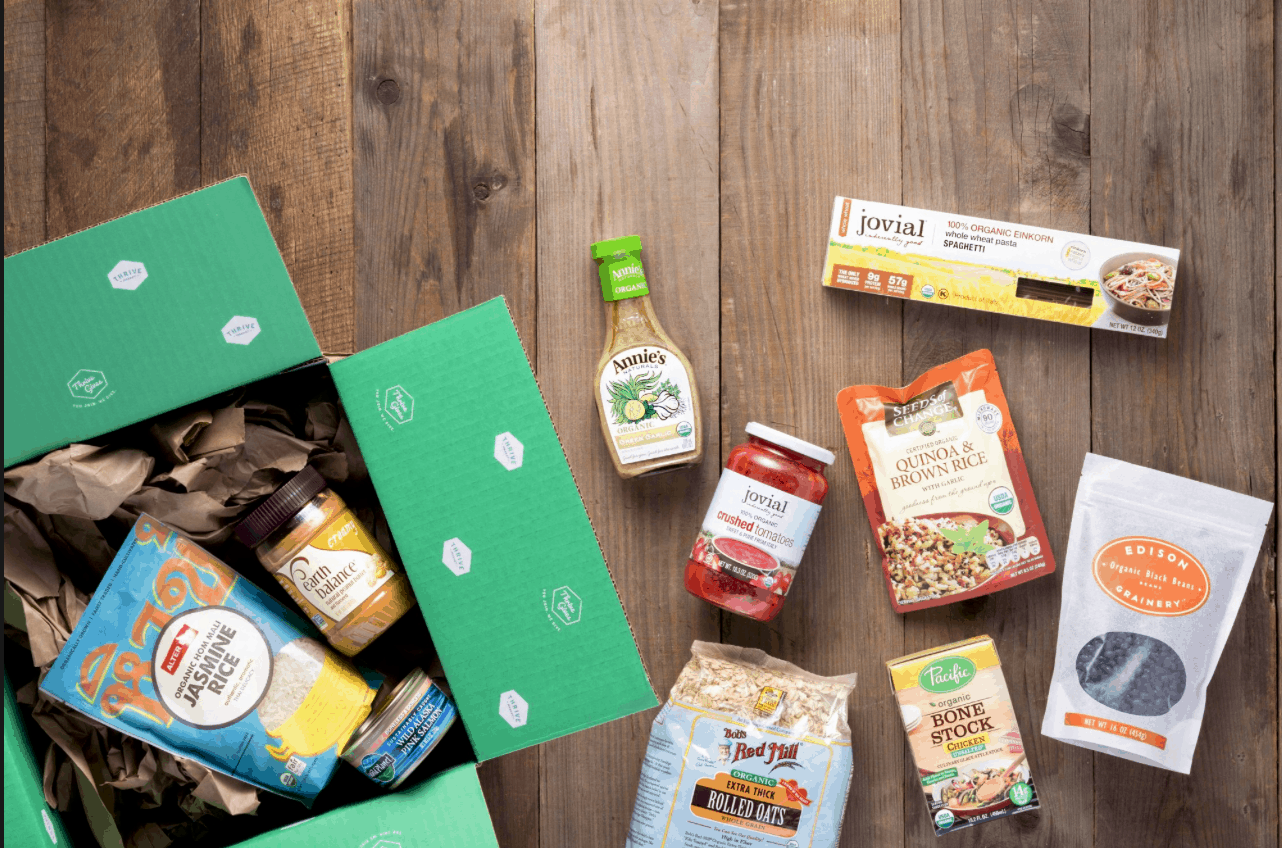
No comments:
Post a Comment